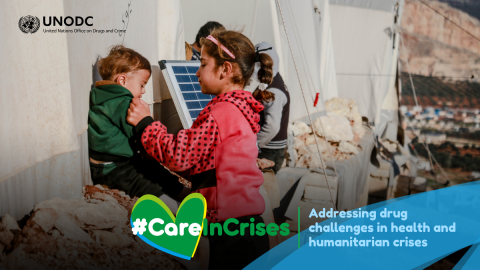We reflect on the theme of World Drug Day 2022 with this exclusive feature from the UNODC Prevention Treatment and Rehabilitation Section.
Health and humanitarian crises impact people’s lives in numerous ways. We have known for a long time that adverse experiences, especially during childhood, are linked to increased vulnerability to starting to use drugs and progressing to drug use disorders. At the same time, these global challenges exacerbate inequalities in the provision of and access to health services, education and employment. This includes both services that would be protective of the healthy and safe development of children and youth, as well as services to protect the health and promote the recovery of people who use drugs and people with drug use disorders.
The data included in the World Drug Report of last year showed an increase in the rate of domestic violence against children, in particular linked to the closing of schools and the loss of income of the family. Further, youth and women were generally hit the hardest by the COVID-19-related recession, while the pandemic marked the greatest increase in mortality in countries heavily affected by the opioid crisis, greater exposure of people who inject drugs to the risk of harm, increased mental health problems such as anxiety and depression .
Since then, two major humanitarian crises have been unfolding in Afghanistan and Ukraine, adding thousands to the number of people displaced due to other conflicts and causes in other parts of the world.
It is imperative to sustain the response to drug challenges in the context of these health and humanitarian crises to protect the right to health of the most vulnerable. UNODC advocates the continuity of services to support children, youth, families, as well as people who use drugs and people with drug use disorder and has developed tools to support this action in the most effective ways.
National, regional and global collaboration is key to attain the vision of health for all to ensure that psychosocial services are available without disruption in times of crises, strengthening the resilience of children, youth, families and all individuals in dealing with extreme stress without resorting to negative coping behaviors. Further, services for people who use drugs and people with drug use disorders need to be included in the list of essential services the continuity of which needs to be ensured also in terms of crisis.
In commemoration of World Drug Day on June 26th, let us all share experiences and inspiration in addressing drugs in the context of humanitarian challenges. Let us all do our part by caring, even in times of crises and leave no one behind.
Join the conversation on social media using the hashtag #CareInCrises. Twitter: @UNODC / @UNODC_PTRS
Special event
Join us on July 7th for a presentation by Giovanna Campello, Chief, UNODC PTRS. Hear highlights from the 2022 edition of the UNODC World Drug Report and the implications for drug prevention, treatment and rehabilitation responses. Register
